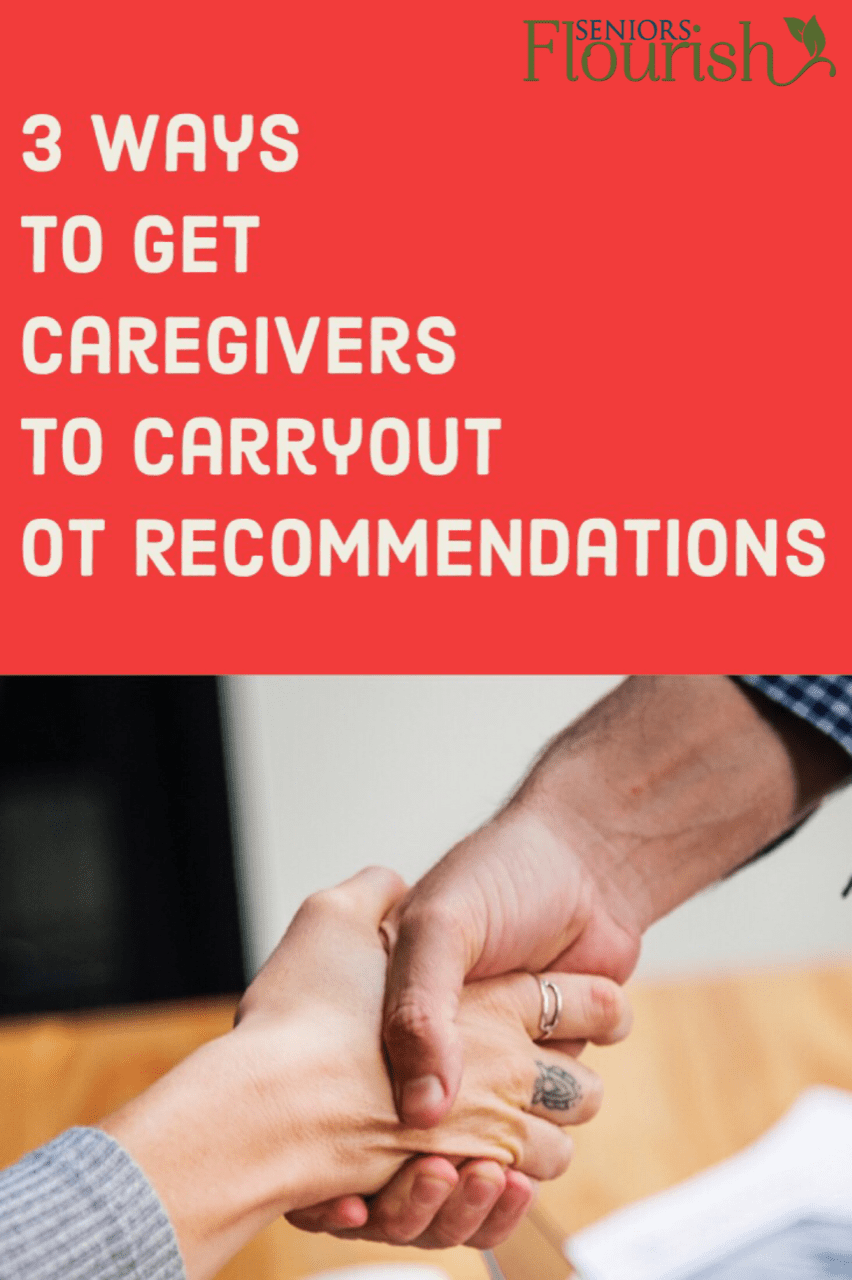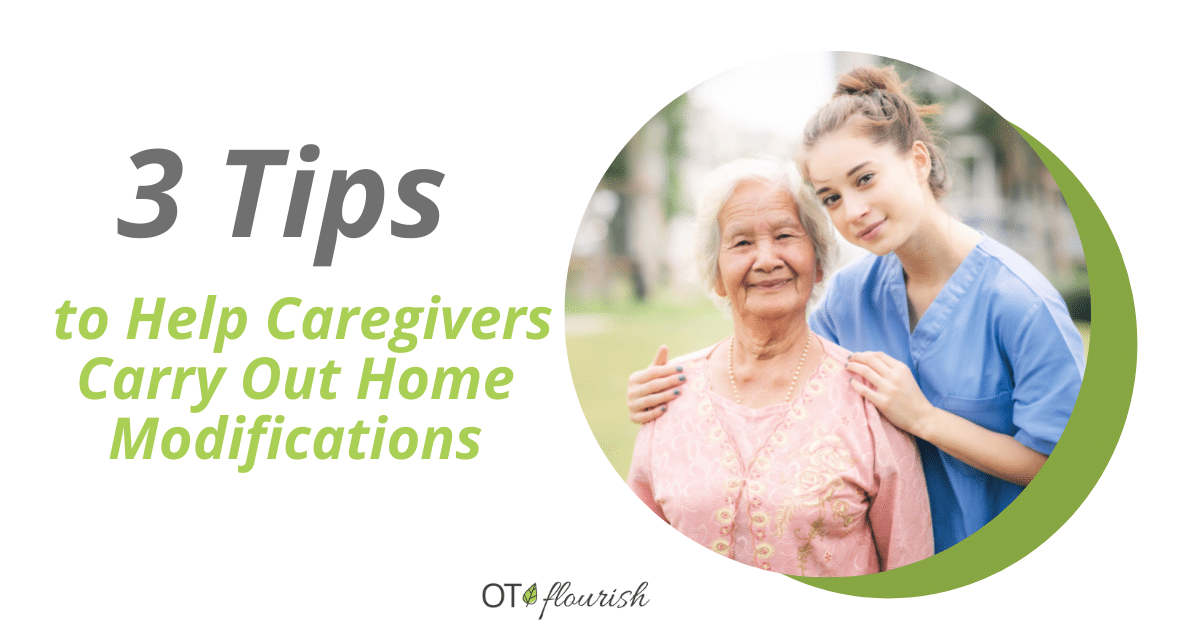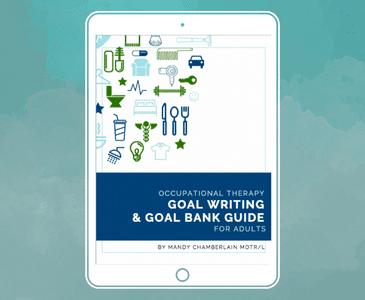Occupational therapy caregiver training – it can be tough. I don’t know about you, but I find it frustrating when my recommendations for simple, low cost home modifications are not carried out after a patient discharges home.
When older adult patients need caregivers help to follow through on home modifications, that means it’s up to us to communicate those needs to the caregivers. Wishing on a prayer that Betty will remember to relay the need for a shower chair or bench before she discharges home is not a good strategy. And I hate to say it, but no one will read the thick stack of paper you leave with the patient when the family comes to visit their loved one in rehab.
But do you know what you could do?
That’s right, read these top 3 tips to help caregivers carry out your home modification recommendations! (Remember to ask the patient’s permission to talk to the caregiver about their personal information.)

1. Befriend the Caregiver to Help Follow Through on Home Modifications
Being a caregiver is the hardest job in the entire world. You are not paid or paid next to nothing to provide services for the most intimate daily activities. Oftentimes, caregivers do not even realize they are caregivers! Strange but true!
Read about my own experience with this phenomenon here, “Am I Really a Caregiver?”
Your job is to get on the same level as the caregiver by:
- Acknowledging the effort they put in to mowing Betty’s lawn and helping her manage her medicine.
- Showing appreciation for their interest in making sure Betty discharges home and lives there safely.
If you show basic respect and kindness to the caregiver, nine times out of ten they will return the favor. Let’s focus on the basic emotion that prompts the caregiver into helping our patients out in the first place: love.
The caregivers love their family member. If you befriend the caregiver and harness that emotion, they will trust you and allow you to guide them towards the home modifications the patient needs. It does not take a lot of effort to establish a relationship with the caregiver. If you start off with a “thank you for talking with me about Betty” or “I appreciate your expertise on what Betty needs,” caregivers will be receptive to your knowledge.
2. Collaborate on How to Transmit Information
Now that you’re friends with Betty’s caregiver, ask the caregiver what mode of information they like best.
- Do they want you to print off your recommendations and sit down to review it?
- What about an email with product links?
- Do they want to have a video conference while shopping at the store for home modification products?
- Does the caregiver want to record your conversation to play it back at a later time?
As occupational therapy practitioners, we understand that people learn information in different ways. We can easily accommodate caregiver’s needs when educating them about home modifications for the patient. If you see a caregiver’s blank stare that reads “does not compute,” then adjust how you are communicating your recommendations.
If we make learning and sharing information with the caregiver as easy as possible, the chances of them following through on home modifications skyrockets! It takes five seconds to ask a caregiver how they want to receive your expert advice.
Listen.
Document.
Feel the sweet satisfaction of knowing you are on the road to collaboration station with the caregiver!
3. Use Easy to Understand Language
Do you want patients and caregivers to understand you the first time you speak?
Do you want to be an effective clinician?
Yes? Then do not use words patients and caregivers do not understand.
I encourage my fieldwork students to talk to patients and caregivers as though they had an eighth grade education. Do not use the words “transfer,” “articulate,” “extend” or anything else that a person would not say in real life. Patients do not come into therapy to take an English lesson on the alternate meaning of those words. They look to you to help them with whatever goals you created in their care plan.
Using words and phrases that caregivers understand will improve the chances of them completing home modifications.
Instead of “super pole,” I say “floor-to-ceiling pole.”
Use “bedside commode” in place of “3-n-1 commode.”
Make sure your language is consistent whether you write it down or speak. Be aware of the words you use when documenting and speaking with other professionals compared to your communication with patients and caregivers. After practicing code switching in this way, you will find it gets much easier!
Our end goal is to maintain our patient’s safety and improve their independence at home. These tips will help you in making sure your patient will have the home modifications they need to live a fulfilling life at home.
We’d love to hear what words and phrases you use to help caregivers easily understand what you are saying in the comments below.
Looking for more information about home modifications?
Make sure to check out “5 Easy Home Mods Occupational Therapy Practitioners Miss” and “High Tech Home Mods for the Generalist OT.”


About our Guest Blogger:
Maria Lindbergh, MOT, ECHM, OTR/L is the owner of Toilet Talk, an occupational therapist who loves pretty potties and hates ugly medical equipment! Check out her website ToiletTalk.me or visit her on Instagram for OT toileting tips and equipment.








